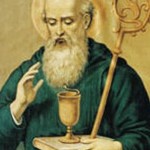Charter of and the Order of Saint Benedict
CHARTER
OF THE
ORDER OF ST. BENEDICT
ARTICLE I
NAME AND FOUNDATION OF THE ORDER
The body organized hereunder is an independent Catholic Order of non-monastic, dispersed clergy, which is named and is known ecclesiastically as The Order of St. Benedict, CCEF (hereinafter, also as the Order or as the Benedictines).
The Order is based on Benedictine spirituality and on the Holy Rule of Saint Benedict.
The Holy Rule of Saint Benedict is characterized by moderation, temperance, discretion, common sense, stability, and holy obedience, following the evangelical counsels in living the life in Christ.
The Holy Rule of Saint Benedict is the most ancient Rule of the Orthodox Patriarchate of Rome, entirely consistent with the purposes, goals and objectives of this Order.
ARTICLE II
PURPOSES, GOALS AND OBJECTIVES
It is the purpose of the Order to provide an ordered religious association for non-monastic, dispersed clergy, in which they may find fellowship and in which they may proclaim the Good News of our Lord Jesus Christ; and to do this for the purposes and promotion of the universal Catholic Christian Faith; to unite believers on the basis of Catholic teachings and traditions for their moral benefit and the satisfaction of their religious needs; to mutually assist believers united in the universal Catholic Faith, by means of prayer and worship, Christian teaching and religious discipline, in attaining salvation through participation in the Holy Sacraments and Christian enlightenment, worthy life and Christian charity; and to undertake charitable works for the good and welfare of the community.
The goals and objectives of the Order are to present the universal Catholic Faith to the people in all its purity and catholic fullness, in all the power of the Holy Spirit; and to provide the people with Sacraments and divine services, with pastoral care and spiritual guidance, and with preaching and teaching of the Holy Gospel.
The motto and two-fold program of the Order is “Work and Pray” (“Labora et Ora”).
In accordance with the program of Work: the Benedictine tradition is that an essential charity is to provide for one’s own support, so that no one else is burdened by the need to provide for one.
Accordingly, the primary goals and objectives of the members of the Order in this respect are to work, in business or employment outside of the Order, to support themselves, their ministries, their families, and the Order, by their own work, so that they may serve God sacrificially as worker-volunteers, serving Him without pay or benefits of any kind. Members of the Order are not employees of the Order and shall receive no wages or benefits at all.
They serve out of love for God, love for their neighbor, love of the truth, and because they feel the call of our Lord Jesus Christ the King to serve Him and to do His work.
In accordance with the program of Prayer: goals and objectives of the members are to know, love, and serve the Lord our God, and to sanctify time by prayer and sacred devotions.
Fulfilling the essential ministry of intercessory prayer is a primary objective of the Order.
ARTICLE III
GOVERNANCE
The Order is governed by the Abbot, who may be assisted by a council of clergy of the Order.
This Charter is the fundamental organizational document of the Order and the source of universal Catholic ecclesiastical authority for the Order.
This Charter may be amended by the Abbot and by majority vote of the council.
The Order shall exist in the United States of America and may exist in any other nation or place with the permission of the Abbot.
A successor to the Abbot is chosen by the council of clergy.
In the absence of such a council, an Episcopal Visitor must be petitioned to fulfill the Abbot’s functions.
Any person seated on the council has one vote in council. All votes are by simple majority.
The council should always attempt to reach consensus.
In case of a tie of votes, the vote of the Abbot prevails.
ARTICLE IV
FAITH AND DISCIPLINE
The Order shall teach that same ancient and universal Catholic Faith which is held and taught by all true Catholic Churches throughout the world.
With respect to ecclesiastical discipline, the traditional universal Catholic disciplinary norms and procedures shall be followed to the extent possible, remembering the ancient principle: “In necessary things, unity; in doubtful things, liberty; in all things, charity.”
Unity in the Faith is essential; in matters of discipline, the Church’s catholicity is proven by local variety, within certain limits.
ARTICLE V
MEMBERSHIP
Canonical members, the Canons, are full members. Membership as a Canon is formal membership in the Order itself. Generic references in this Charter to “members” refer to the Canons.
The Order’s international membership is comprised of the combined Canon membership of the Order’s national chapters in every nation and place wherein it exists; every Canon has the right to be heard and to vote in the councils of the local jurisdiction, in accordance with the local jurisdiction’s own rules.
“Associate Members” are those who are in concord with the purposes, goals and objectives of the Order and who associate themselves with the Order without joining the Order as a Canon.
Members of any subsidiary organization of the Order are not joined thereby to the Order.
Neither associate membership nor subsidiary organization membership are membership in the Order itself. Membership, canonical, associate, subsidiary organization, or otherwise, is entirely ecclesiastical; it does not give members any membership rights or voting rights in any legal organization of the Order, except insofar as may be specified in the By-Laws of any such organization.
Membership in the Order does not constitute a civil, secular, legal contractual arrangement or contract of any kind whatsoever, nor does it constitute an employer – employee relationship of any kind whatsoever; and all members are personally responsible, each individually, for their own housing and subsistence, and support of every kind. There are no civil, secular, legal benefits of any kind, which accrue by virtue of membership in the Order.
No one shall be disqualified from membership, from any office, or from Holy Orders, nor shall membership, voting, office, or any rights or privileges be denied or prejudiced, by reason of race, color, ethnicity, or national origin.
ARTICLE VI
CIVIL LAW
All members, in their civil business, corporations, etc., must comply with federal, State, and local secular civil and criminal laws and regulations, and must undertake everything honestly and ethically, holding the Order, the Abbot, and the council harmless and free of liability.
Hereby, every member is strongly exhorted to honest, decent, moral, behavior, in accord with Christian teachings and beliefs, and to comply with federal, State, and local secular civil and criminal laws and regulations as a law-abiding citizen; anyone who fails to do so is solely and personally liable for his actions or omissions. All members of the Order are expected and required hereby to always act legally and with financial responsibility, both in their private lives and their ministries.
The Order, the Abbot, and the council disclaim all responsibility and liability of any kind whatsoever for any and every kind of debt contracted by any member of the Order which is incurred without proper and explicit prior written authorization and/or in violation of the Order’s rules.
Canons must particularly take care to keep accurate records of the sacraments officiated and to comply with laws and regulations with regard to baptisms, marriages, divorces, burials, and other rites, including those dealing with filing of records or with religious organizations, non-profit organizations, fund-raising, etc.; and must acquaint themselves with the laws and regulations in their localities.
Members of the Order may be prepared by religious training, and may be authorized by their Abbot by their receipt of explicit faculties, to provide spiritual guidance.
The Order does not train anyone for, and does not authorize or permit anyone to engage in, any kind of professional counseling.


